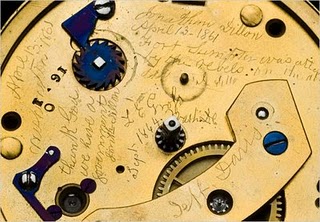 If you haven’t already done so, get your blog post nominations in for Carnivalesque 48, the early modern edition! If you’ve come across–or if you’ve written–a great blog post that concerns the period 1500 to 1800, please let me know about it by emailing me or by using the nomination form. I’ll be posting my edition this weekend, so get your suggestions in now!
If you haven’t already done so, get your blog post nominations in for Carnivalesque 48, the early modern edition! If you’ve come across–or if you’ve written–a great blog post that concerns the period 1500 to 1800, please let me know about it by emailing me or by using the nomination form. I’ll be posting my edition this weekend, so get your suggestions in now!
I assume most of you recognize the image I’ve used to illustrate my theme of time’s a tickin’–it’s Abraham Lincoln’s watch, recently opened up by the Smithsonian to reveal messages inscribed on the underside of the watch movement. It seemed appropriate for this post not simpy because it demonstrates the passage of time, nor because it lets me demonstrate my fondness for things pertaining to Lincoln, although it does do both of those things wonderfully. But it also gestures toward something that I am not usually concerned with, given my focus on things bookish: writing happens not only on paper and on parchment, not only in the context of books and blogs, but in a wider range of contexts and on a wider range of materials than we sometimes remember to consider. I don’t know when I’ll be returning to this theme, but the place to go for learning more about this sort of writing practice in our period is Juliet Fleming’s Graffiti and the Writing Arts of Early Modern England (U Pennsylvania P, 2001).